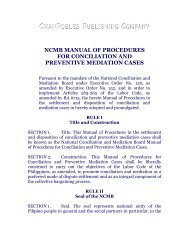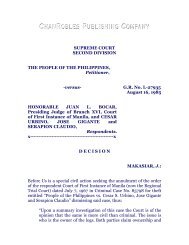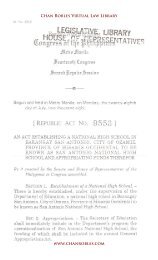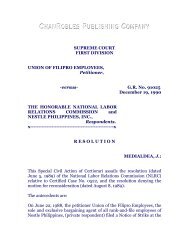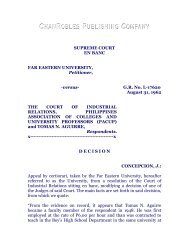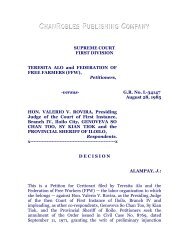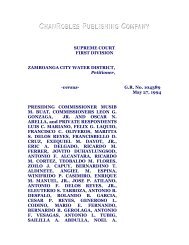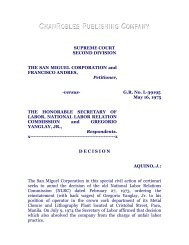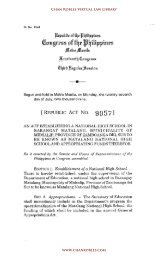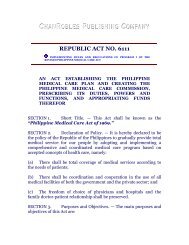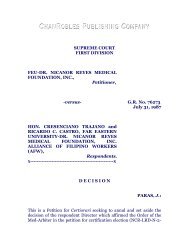Carmelcraft Corporation vs. NLRC - Chan Robles and Associates ...
Carmelcraft Corporation vs. NLRC - Chan Robles and Associates ...
Carmelcraft Corporation vs. NLRC - Chan Robles and Associates ...
Create successful ePaper yourself
Turn your PDF publications into a flip-book with our unique Google optimized e-Paper software.
SUPREME COURT<br />
FIRST DIVISION<br />
CARMELCRAFT CORPORATION &/OR<br />
CARMEN V. YULO, President <strong>and</strong><br />
General Manager,<br />
Petitioners,<br />
-versus- G.R. Nos. 90634-35<br />
June 6, 1990<br />
NATIONAL LABOR RELATIONS<br />
COMMISSION, CARMELCRAFT<br />
EMPLOYEES UNION, PROGRESSIVE<br />
FEDERATION OF LABOR, represented<br />
by its Local President GEORGE OBANA,<br />
Respondents.<br />
x---------------------------------------------------x<br />
D E C I S I O N<br />
CRUZ, J.:
The Court is appalled by the degree of bad faith that has characterized<br />
the petitioners’ treatment of their employees. It borders on pure<br />
disdain. And on top of this, they now have the temerity to seek from<br />
us a relief to which they are clearly not entitled. The petition must be<br />
dismissed. chanroblespublishingcompany<br />
The record shows that after its registration as a labor union, the<br />
<strong>Carmelcraft</strong> Employees Union sought but did not get recognition<br />
from the petitioners. Consequently, it filed a petition for certification<br />
election in June 1987. On July 13, 1987, <strong>Carmelcraft</strong> <strong>Corporation</strong>,<br />
through its president <strong>and</strong> general manager, Carmen Yulo, announced<br />
in a meeting with the employees that it would cease operations on<br />
August 13, 1987, due to serious financial losses. Operations did cease<br />
as announced. On August 17, 1987, the union filed a complaint with<br />
the Department of Labor against the petitioners for illegal lockout,<br />
unfair labor practice <strong>and</strong> damages, followed the next day with another<br />
complaint for payment of unpaid wages, emergency cost of living<br />
allowances, holiday pay, <strong>and</strong> other benefits. On November 29, 1988,<br />
the Labor Arbiter declared the shutdown illegal <strong>and</strong> violative of the<br />
employees’ right to self-organization. The claim for unpaid benefits<br />
was also granted. [1] After reviewing the decision on appeal, the<br />
respondent <strong>NLRC</strong> declared: chanroblespublishingcompany<br />
WHEREFORE, premises considered, the appealed decision is<br />
modified. In addition to the underpayment in their wages,<br />
emergency living allowance, 13 th month pay, legal holiday pay<br />
<strong>and</strong> premium pay for holidays for a period of three years, the<br />
respondents are ordered to pay complainants their separation<br />
pay equivalent to one-month pay for every year of service, a<br />
fraction of six months or more shall be considered as one (1)<br />
whole year.<br />
The rest of the dispositions st<strong>and</strong>. [2]<br />
We do not find that the above decision is tainted with grave abuse of<br />
discretion. On the contrary, it is conformable to the pertinent laws<br />
<strong>and</strong> the facts clearly established at the hearing. chanroblespublishingcompany<br />
The reason invoked by the petitioner company to justify the cessation<br />
of its operations is hardly credible; in fact, it is preposterous when
viewed in the light of the other relevant circumstances. Its<br />
justification is that it sustained losses in the amount of P1,603.88 as<br />
of December 31, 1986. [3] There is no report, however, of its operations<br />
during the period after that date, that is, during the succeeding seven<br />
<strong>and</strong> a half months before it decided to close its business. Significantly,<br />
the company is capitalized at P3 million. [4] Considering such a<br />
substantial investment, we hardly think that a loss of the paltry sum<br />
of less than P2,000.00 could be considered serious enough to call for<br />
the closure of the company.<br />
We agree with the public respondent that the real reason for the<br />
decision of the petitioners to cease operations was the establishment<br />
of respondent <strong>Carmelcraft</strong> Employees Union. It was apparently<br />
unwelcome to the corporation, which would rather shut down than<br />
deal with the union. There is the allegation from the private<br />
respondent that the company had suggested that it might decide not<br />
to close the business if the employees were to affiliate with another<br />
union which the management preferred. [5] This allegation has not<br />
been satisfactorily disproved. At any rate, the finding of the <strong>NLRC</strong> is<br />
more believable than the ground invoked by the petitioners. Notably,<br />
this justification was made only eight months after the alleged yearend<br />
loss <strong>and</strong> shortly after the respondent union filed a petition for<br />
certification election.<br />
The act of the petitioners was an unfair labor practice prohibited by<br />
Article 248 of the Labor Code, to wit:<br />
ART. 248. Unfair labor practices of employers. — It shall be<br />
unlawful for an employer to commit any of the following unfair<br />
labor practice:<br />
(a) To interfere with, restrain or coerce employees in the<br />
exercise of their right to self-organization;<br />
More importantly, it was a defiance of the constitutional provision<br />
guaranteeing to workers the right to self-organization <strong>and</strong> to enter<br />
into collective bargaining with management through the labor union<br />
of their own choice <strong>and</strong> confidence. [6] chanroblespublishingcompany
The determination to cease operations is a prerogative of<br />
management that is usually not interfered with by the State as no<br />
business can be required to continue operating at a loss simply to<br />
maintain the workers in employment. [7] That would be a taking of<br />
property without due process of law which the employer has a right to<br />
resist. But where it is manifest that the closure is motivated not by a<br />
desire to avoid further losses but to discourage the workers from<br />
organizing themselves into a union for more effective negotiations<br />
with the management, the State is bound to intervene.<br />
And, indeed, even without such motivation, the closure cannot be<br />
justified because the claimed losses are obviously not serious. In this<br />
situation, the employees are entitled to separation pay at the rate of<br />
one-half month for every year of service under Art. 283 of the Labor<br />
Code.<br />
The contention of the petitioners that the employees are estopped<br />
from claiming the alleged unpaid wages <strong>and</strong> other compensation<br />
must also be rejected. This claim is based on the waivers supposedly<br />
made by the complainants on the underst<strong>and</strong>ing that “the<br />
management will implement prospectively all benefits under existing<br />
labor st<strong>and</strong>ard laws.” The petitioners argue that this assurance<br />
provided the consideration that made the quitclaims executed by the<br />
employees valid. They add that the waivers were made voluntarily<br />
<strong>and</strong> contend that the contract should be respected as the law between<br />
the parties. chanroblespublishingcompany<br />
Even if voluntarily executed, agreements are invalid if they are<br />
contrary to public policy. This is elementary. The protection of labor<br />
is one of the policies laid down by the Constitution not only by<br />
specific provision but also as part of social justice. The Civil Code<br />
itself provides:<br />
ART. 6. Rights may be waived, unless the waiver is contrary<br />
to law, public order, public policy, morals, or good customs, or<br />
prejudicial to a third person with a right recognized by law.<br />
ART. 1306 The contracting parties may establish such<br />
stipulations, clauses, terms <strong>and</strong> conditions as they may deem
convenient, provided they are not contrary to law, morals, good<br />
customs, public order, or public policy. chanroblespublishingcompany<br />
The subordinate position of the individual employee vis-a-vis<br />
management renders him especially vulnerable to its bl<strong>and</strong>ishments<br />
<strong>and</strong> importunings, <strong>and</strong> even intimidation’s, that may result in his<br />
improvidently if reluctantly signing over benefits to which he is<br />
clearly entitled. Recognizing this danger, we have consistently held<br />
that quitclaims of the workers’ benefits will not estop them from<br />
asserting them just the same on the ground that public policy<br />
prohibits such waivers.<br />
That the employee has signed a satisfaction receipt does not result in<br />
a waiver; the law does not consider as valid any agreement to receive<br />
less compensation than what a worker is entitled to recover. A deed of<br />
release or quitclaim cannot bar an employee from dem<strong>and</strong>ing<br />
benefits to which he is legally entitled. [8]<br />
Release <strong>and</strong> quitclaim is inequitable <strong>and</strong> incongruous to the declared<br />
public policy of the State to afford protection to labor <strong>and</strong> to assure<br />
the rights of workers to security of tenure. [9]<br />
We find also untenable the contention of Carmen Yulo that she is not<br />
liable for the acts of the petitioner company, assuming it had acted<br />
illegally, because the <strong>Carmelcraft</strong> <strong>Corporation</strong> is a distinct <strong>and</strong><br />
separate entity with a legal personality of its own. Yulo claims she is<br />
only an agent of the company carrying out the decisions of its board<br />
of directors. We do not agree. Our finding is that she is in fact <strong>and</strong><br />
legal effect the corporation, being not only its president <strong>and</strong> general<br />
manager but also its owner. [10]<br />
Moreover, <strong>and</strong> this is a no less important consideration, she is raising<br />
this issue only at this tardy hour, when she should have invoked this<br />
argument earlier, when the case was being heard before the labor<br />
arbiter <strong>and</strong> later in the <strong>NLRC</strong>. It is too late now to shunt these<br />
responsibilities to the company after she herself had been found<br />
liable. chanroblespublishingcompany<br />
All told, the conduct of the petitioners toward the employees has been<br />
less than commendable. Indeed, it is reprehensible. First, the
company inveigled them to waive their claims to compensation due<br />
them on the promise that future benefits would be paid (<strong>and</strong> to make<br />
matters worse, there is no showing that they were indeed paid).<br />
Second, it refused to recognize the respondent union, suggesting to<br />
the employees that they join another union acceptable to<br />
management. Third, it threatened the employees with the closure of<br />
the company <strong>and</strong> then actually did so when the employees insisted on<br />
their dem<strong>and</strong>s. All these acts reflect on the bona fides of the<br />
petitioners <strong>and</strong> unmistakably indicate their ill will toward the<br />
employees.<br />
The petitioners obviously regard the private respondents as mere<br />
servants simply because they are paid employees. That is a mistake.<br />
Laborers are not just hired help to be exploited, without the right to<br />
defend <strong>and</strong> improve their interests. The working class is an equal<br />
partner of management <strong>and</strong> should always be treated as such. chanroblespublishingcompany<br />
The more labor is prevented from pursuing its legitimate dem<strong>and</strong>s for<br />
its protection <strong>and</strong> enhancement, the more it is likely to lose faith in<br />
our free institutions <strong>and</strong> to incline toward ideologies offering a more<br />
attractive if deceptive regime. One way of disabusing our working<br />
men <strong>and</strong> women of this delusion is to assure them that under our<br />
form of government, the interests of labor deserve <strong>and</strong> will get proper<br />
recognition from an enlightened <strong>and</strong> compassionate management, no<br />
less than the total sympathy of a solicitous State. chanroblespublishingcompany<br />
WHEREFORE, the petition is DISMISSED <strong>and</strong> the challenged<br />
decision is AFFIRMED, with costs against the petitioner. It is so<br />
ordered. chanroblespublishingcompany<br />
Narvasa, Gancayco <strong>and</strong> Medialdea, JJ., concur.<br />
Griño-Aquino, J., is on leave. chanroblespublishingcompany<br />
chanroblespublishingcompany<br />
[1] Rollo, pp. 12-13.<br />
[2] Ibid., p. 19. chanroblespublishingcompany<br />
[3] Id., p. 14. chanroblespublishingcompany<br />
[4] Id., p. 6. chanroblespublishingcompany<br />
[5] Id., pp. 26-29.<br />
[6] Art. XIII, Sec. 3. Constitution.
[7] Columbia Development Corp. <strong>vs</strong>. Minister of Labor <strong>and</strong> Employment, 146<br />
SCRA 42; LVN Pictures <strong>and</strong> Workers Association <strong>vs</strong>. LVN Pictures, 35 SCRA<br />
147; Phil. American Embroideries, Inc. <strong>vs</strong>. Embroidery & Garment Workers<br />
Union, 26 SCRA 634. chanroblespublishingcompany<br />
[8] Fuentes <strong>vs</strong>. <strong>NLRC</strong>, 167 SCRA 767, citing MRR Crew Union <strong>vs</strong>. PNR, 72<br />
SCRA 88. chanroblespublishingcompany<br />
[9] Cuales <strong>vs</strong>. <strong>NLRC</strong>, 121 SCRA 812.<br />
[10] Rollo, pp. 52-53. chanroblespublishingcompany



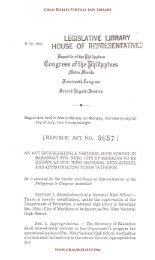
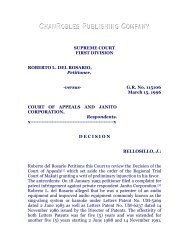
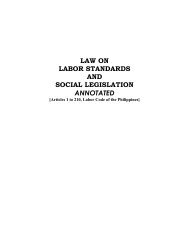
![Aurelio vs. NLRC, (221 SCRA 432 [1993]) - Chan Robles and ...](https://img.yumpu.com/51280528/1/190x245/aurelio-vs-nlrc-221-scra-432-1993-chan-robles-and-.jpg?quality=85)
